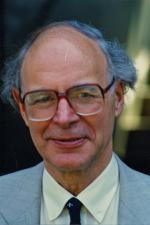Disable ads!
Arthur Peacocke
Natural evil as necessity[edit] The natural-evil-as-necessity argument is meant to be a response to the classic philosophical argument of the Problem of Evil, which contends that an all-powerful, all-knowing and beneficent God cannot exist as such because natural evil (mudslides which crush the legs of innocent children, for instance) occurs. Peacocke contends that the capacities necessary for consciousness and thus a relationship with God also enable their possessors to experience pain, as necessary for identifying injury and disease. Preventing the experience of pain would prevent the possibility of consciousness. Peacocke also takes an eastern argument for natural evil of that which made must be unmade for a new making to occur; there is no creation without destruction. To Peacocke, it is necessary that organisms go out of existence for others to come into it. Thus, pain, suffering and death are necessary evils in a universe which will result in beings capable of having a relationship with God. God is said to suffer with His creation because He loves creation, conforming the deity to be consistent with the Christian God. Jesus as pinnacle of human evolution[edit] The Jesus-as-pinnacle-of-human-evolution argument proposed by Peacocke is that Jesus Christ is the actualisation of [evolutionary] potentiality can properly be regarded as the consummation of the purposes of God already incompletely manifested in evolving humanity…. The paradigm of what God intends for all human beings, now revealed as having the potentiality of responding to, of being open to, of becoming united with, God. (484–5) Similar propositions had previously been put by writers such as C. S. Lewis (in Mere Christianity) and Teilhard de Chardin. Relationship between theology and science typology[edit] In the introduction to The Sciences and Theology in the Twentieth Century, Peacocke lists a set of eight relationships that could fall upon a two-dimensional grid. This list is in part a survey of deliberations that occurred at the World Council of Churches Conference on "Faith, Science and the Future", Cambridge, Mass., 1979. Science and theology are concerned with two distinct realms Reality is thought of as a duality, operating within the human world, in terms of natural/supernatural, spatio-temporal/the eternal, the order of nature/the realm of faith, the natural(or physical)/the historical, the physical-and-biological/mind-and-spirit. Science and theology are interacting approaches to the same reality Accuracy of this view is widely and strongly resisted among those who otherwise differ in their theologies Science and theology are two distinct non-interacting approaches to the same reality The idea that theology tries to answer the question why, while science tries to answer the question how Science and theology constitute two different language systems Each are two distinct "language games" whose logical pre-conditions can have no bearing upon each other according to late-Wittgensteinian theory Science and theology are generated by quite different attitudes (in their practitioners) the attitude of science is that of objectivity and logical neutrality; that of theology personal involvement and commitment. Science and theology are both subservient to their objects and can only be defined in relation to them Both are intellectual disciplines shaped by their object (nature or God) to which they direct their attention. Both include a confessional and a rational factor. Science and theology may be integrated Science generates a metaphysic in terms of which theology is then formulated For example Alfred North Whitehead's metaphysics forms the basis of process theology
 Read more on wikipedia.org Read more on wikipedia.org
 All quotes by Arthur Peacocke All quotes by Arthur Peacocke
 Edit Edit
|

|
|
|
|
|
Background photo by Giuliana
|